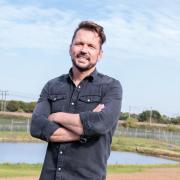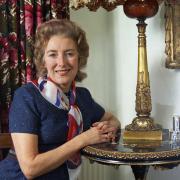Early in the year seems to be a time for change, with job applications spiking as we revaluate our priorities for the new year. Looking to make a change? Essex is the perfect place to do so with incredible businesses and organisations with wonderfully varied roles. Hannah Gildart talks to five people who have found their dream job in the county.

Dave Piper – the National Trust countryside manager
In his role as countryside manager for the Essex and Suffolk portfolio of the National Trust, Dave Piper is not only responsible for places of great historic and environmental importance, but also for preserving Constable country and some of the best-loved scenes in the UK.
Dave tells us, ‘I head up teams covering varied sites from Constable country in Dedham and Danbury Commons to SSSI (Site of Special Scientific Interest) woodlands and the motte and bailey castle at Rayleigh Mount. I also assist the garden teams at Bourne Mill in Colchester and Grange Barn and Paycockes in Coggeshall – all the outdoors stuff!’
Conservation is at the heart of everything Dave does. ‘Dedham Vale is famous for being Constable country, and I have 10 of his most iconic views on my remit. It’s not a case of fossilising those scenes, but making sure they’re recognisable; people travel from across the globe to see The Haywain, if it looks a mess, it’s on my shoulders. Also, we don’t own everything in that view, so we work with our partners such as the RSPB, River Stour Trust and the Field Studies Council at Flatford Mill.’

Dave's team at Danbury are doing incredible work managing the heathland, scrub and SSSI ancient coppice woodland to ensure its residents – lizards, adders, dormice, barbastelle bats and lots more – are able to thrive. Over at Rayleigh Mount, he works with the committee there to use and teach old woodland management techniques such as coppicing and pollarding. ‘I keep getting reminded by friends and family how great my job is,’ Dave smiles. ‘I was recently talking to my wife who was stuck in traffic in Colchester, while I was spotting a barn owl flying right in front of me!’
Taking the National Trust job 14 years ago, after a stint as a park ranger at Langdon Hills, Dave was drawn to how varied the role was. ‘I wanted to work in countryside management and then I suddenly found myself looking after Bourne Mill,’ he says. ‘I wasn’t always into history, but when you learn the stories, it brings places to life. I was talking to a couple of people at the University of Essex about highlighting the textiles industry in Colchester, before I knew it, I was assisting lecturing on a history degree!’ He’s also keen to highlight important countryside matters. ‘One of the issues we’re facing is an exponential growth in the number of people coming to the Dedham Vale on the river,’ Dave says. ‘People don’t think about the wildlife underneath the water or the wear and tear on the riverbanks. We’re working with our partners to raise awareness of this.’
'I just love my job! Every day, week and season is different. I love taking my family, including my 10-year-old son up to Flatford. It’s not like going to work – I just love the area. I have to tell my family to stop me from wandering off to look at trees! During lockdown, my son came to work with me for a couple of days and we spotted wild otters on the river for the first time. He called it a bucket-list moment.’
nationaltrust.org.uk

Katie Bond – the oyster queen
Mersea Island has been known for its oysters since Roman times, when the inhabitants of Camulodunum (that’s Colchester to you and I) would holiday there and dine on the delicacy. Katie Bond of Colchester Oyster Fishery, a Cheshire girl who now gladly calls Essex home, is helping to keep this famous local produce on the map.
‘One day I might be on the boat dredging oysters or hand-picking them,’ Katie says. ‘Other days I'll be packing deliveries to London. We’re a much smaller company than we were pre-Covid, so we all pull together and do lots of different jobs.’
Depending on tide times, Katie’s day can start anytime between 4am and 10am. They take the dory to the dredging boat in the river, then go down to the oyster beds. ‘I pick the ones that are the right size from the haul; leaving the small oysters to keep growing and the big ones to keep providing the spat [oyster larvae] to create oysters for the coming years.’ Amazingly, it takes about three years for a rock oyster to go from spat to a size that you’d eat – that increases to five or six years for a native oyster. Once they have enough oysters, it’s back to terra firma where they’re washed, graded, counted and put in depuration tanks ready to sell.

It may sound like hard work, but Katie loves her job. ‘The best part is being out on the water. It’s nice in summer when it’s warmer, but it’s beautiful in winter too. We often see seals swimming alongside the boat or basking in the sun on the mud. There are so many birds too. In November all the geese come back, which signals that winter is coming. I enjoy being outside just watching the wildlife. I’m lucky to have that as my office.’
The fishery is steeped in history. Katie explains, ‘When Colchester was the capital of England, all the boats would have come through our fishery to get to Colchester; it’s quite something to be out on the water seeing pretty much the same things the Romans would have seen. The fishery works the river on a lease that was initially granted by Richard the Lionheart. It’s important for businesses like us to keep our local history alive.’
They’re not just keeping it alive, but helping it thrive too, despite the pandemic’s lasting effects on business. ‘In a normal year we sell about 1.5 million oysters and 150 tonnes of lobster,’ Katie tells us. ‘Our oysters are served in the finest restaurants in London and we export them all over the world. We have one chef in Barbados who will only serve Colchester oysters as they’re the best!’
Katie’s top tip: You must never cook a native oyster; they’re best eaten raw. Tip away the liquid in the shell when you first open it, as that’s just seawater. You should chew the oyster, not just swallow it, as you will miss out on all the flavour!
colchesteroysterfishery.com

Lisa Davis – the zookeeper
If you live in Essex, you’re almost guaranteed to have visited Colchester Zoo. Opened in 1963, it has since become one of the top zoos in the country with conservation at the heart of everything it does. As leader of the Familiar Friends team, Lisa Davis plays a key role in getting visitors excited about animals.
‘My section is very diverse,’ Lisa explains. ‘I care for a range of animals such as reptiles, birds, small mammals, fish and some hoof stock such as horses, reindeer, goats and sheep. My day starts by ensuring all the animals are in good health and there are no obvious problems such as broken fencing or heating issues. I then give everyone breakfast and make sure they’re all eating and behaving normally. Then, it’s time for cleaning! Every single animal is cleaned to a very high standard, from scrubbing pools and replacing bedding to raking to make it look attractive. We also wash the windows, so our guests have good vision of the animals.’
While the cleaning may not be to everyone’s liking, I’m sure we’d all love to get up close to these adorable animals. ‘The parts of my job that I enjoy the most are when I get to be hands-on. I like to help the vets when they’re looking at any medical issues and support them by keeping the animals calm and restraining them safely. I also enjoy doing animal transfers; I’ve been as far as Scotland to pick up reindeer!’
No matter what’s going on in the world, the team are there to give the animal residents the very best of care. Lisa says, ‘The job means working in all sorts of weather. Extremely hot days are just as difficult to manage as deep snow! We always adapt well and do our very best.’
‘Although we are close to all the animals we work with, sometimes you do get that special bond with one. Mine was a reindeer called Thunder. He was a gentle giant and simply beautiful in every way.’ Making sure the residents are happy is a pivotal part of the role. ‘We do regular enrichment tasks with them, such as hiding food and toys, giving them things to climb on, moving enclosure furniture around and putting down different scents to stimulate them. Some of the animals on my section are even seen having a walk around the zoo – much like you would your dog!’
These activities were particularly important during lockdown, with some animals missing the usual interaction. ‘It was a strange time for us all. We're so used to the zoo being full of life. There were some animals who really missed the visitors, particularly the goats and lorikeets on my section, as they love the attention they get from guests. We obviously gave them lots of extra TLC but as soon as we reopened, they definitely enjoyed the attention!’
colchesterzoo.org

Ian Chandler – the Markshall Estate arboretum manager
As arboretum manager at Markshall Estate, Ian Chandler is one of a long line of people who have had the privilege of being guardian of this unique landscape. For 23 years, he has lovingly tended and managed the world-class arboretum and he lives in a tied cottage on site.
‘On an average day I’m in the office by 7.30am to catch up on paperwork or emails, then I’ll spend the morning in the arboretum or woodlands planning work and seeing how projects are progressing,’ Ian says. ‘It’s easy to get distracted during this time and start thinking about future plans, which are always in the back of my mind. Meetings with the teams are a daily occurrence to keep up-to-date; there’s always a huge amount going on behind-the-scenes that visitors don’t see. I still try to make time to get stuck in with some pruning, weeding and mowing.’
While Ian loves every part of his job, he has had to adapt to the seasons. ‘I have learnt to embrace office work during the cold, wet days,’ he smiles. But even in winter, he counts his blessings. ‘It’s rare that an opportunity comes along to be involved in creating an arboretum on this scale. It will be here for generations to come; that sense of job satisfaction is immeasurable.’

Another cause for pride is the way in which the estate is devoted to sustainability. ‘We are always embracing more eco-friendly practices,’ Ian tells us. ‘The arisings from our tree work is either used for the heating system in the visitor centre or chipped to be used as mulch. We’ve started introducing battery-powered hand tools instead of using petrol and even our office shreddings are incorporated into the composting system. Deadwood piles are created for creepy crawlies and within the plant nursery we have pollinator beds for bees and butterflies.’
I’ve visited Markshall Estate since I was a child, so what’s new to see? ‘At the moment we have two large landscaping projects underway,’ Ian says. ‘A new lake has been created in the North American section, while to the east, 17,000m3 of soil has been brought in to create a Himalayan range in the Asia section. Although still under construction, these areas will provide unique planting opportunities. We have plans to extend the hard path network through here so it’s accessible to all visitors. During lockdown, we created a new outdoor play area, Wild Wood, which encourages children to play in a natural environment, building dens, using the stepping stones and playing on sections of felled trees.’
Ian was able to continue working throughout the pandemic and was grateful to be able to spend time in such beautiful surroundings. He says, ‘The arboretum is roughly 200 acres and we have (probably) the largest collection of wollemi pines in Europe, which were only rediscovered in 1994 and grew when dinosaurs walked the earth. As a trust, we have a Landscape Master Plan, which gives us a vision to work to for the next 30-50 years.’
markshall.org.uk

Amanda Powell – the flower farmer
With a suburban half-acre flower field twenty minutes from her floristry studio in Shoeburyness, Amanda Powell is a florist and farmer in one. When she’s not harvesting, she’s designing all sorts of beautiful seasonal arrangements for weddings, gifts and for people’s homes.
‘As a farmer, I like to think of flowers as soul food,’ Amanda says. ‘It’s an opportunity to bring a bit of the outdoors inside to enjoy. It is a real pleasure to be out in the field harvesting only the best flowers I have, knowing that the next day they will be in someone’s home.’
She now grows seasonal English blooms, including tulips, sweet peas, sunflowers, snapdragons, cosmos, roses and dahlias, but Amanda’s love for plants started from a young age. She remembers, ‘My earliest growing memory was at school – a little broad bean in a glass jar, which I took to my grandad’s greenhouse and checked daily over half term. As a child, we moved around a lot and I got to visit many countries; it was the variety of scents and blooms from each place that struck me.’
‘There is a simple joy in tending the soil and making the conditions just right to grow strong and healthy plants to feed our body and soul. I also grow fruit and the leaves and blossom often slip into my floral arrangements. Later in the season, my children are let loose to harvest their fruity treasure to devour and share.’

According to The Guardian, homegrown flowers accounted for just 14% of the £865m spent on all stems sold in the UK. ‘Why wouldn’t you grow locally if you can?’ Amanda asks. ‘They can be picked from the field one day and the next morning be in your vase at home; it would be hard to get anything fresher. As an artisan producer, I can get lots more variety, which means more scent and texture in your floristry.’
Of course, there is the environmental impact of importing flowers too. ‘Many countries use pesticides, and sometimes it’s needed before they’re exported to ensure that we’re not importing pests and diseases. However, pesticides don’t sit well with me. Weeds still grow back, so what’s the point in harming the eco-system nature has given us? Now that I spend time in the field daily, I get to see what bugs and animals live there. As a grower, I am disrupting their habitat. I have a responsibility to reduce my impact as much as possible.’
Not long after the first lockdown, Amanda’s scented daffodils started to bloom, but with the London markets closed, she had nowhere to sell them. ‘I popped bunches out on my bike, people could pay for them or just take a bunch to cheer themselves up,’ she says. ‘Word soon spread on social media and the orders started coming through. I was doing doorstep deliveries, getting to meet the customers and the friends they were gifting to. I saw the joy that my Essex field-grown flowers gave to people and it really brought home how meaningful my job is.’
flowerfarmer.co.uk




























